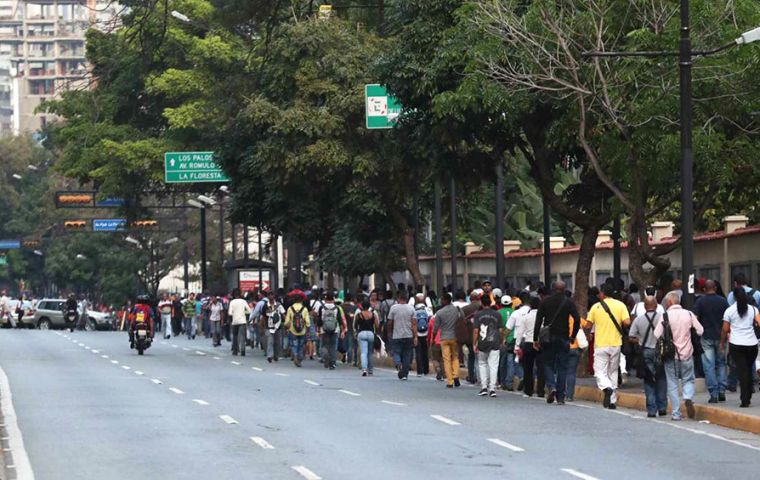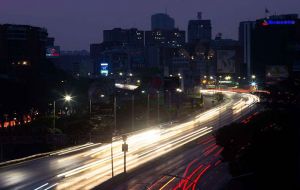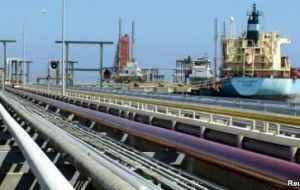MercoPress. South Atlantic News Agency
Venezuelan workers sent home and schools closed because of the blackout
 Power had returned to many parts of Caracas by noon on Tuesday, but businesses remained idle and few pedestrians were walking the streets
Power had returned to many parts of Caracas by noon on Tuesday, but businesses remained idle and few pedestrians were walking the streets  Maracaibo and Barquisimeto, as well as the central city of Valencia, also had no power on Tuesday, according to witnesses
Maracaibo and Barquisimeto, as well as the central city of Valencia, also had no power on Tuesday, according to witnesses  The largest oil export terminal of Jose was paralyzed with the outage while Refinitiv Eikon data showed no ships had left the terminal since Sunday
The largest oil export terminal of Jose was paralyzed with the outage while Refinitiv Eikon data showed no ships had left the terminal since Sunday Venezuela's government told workers and school children to stay home on Tuesday as the second major blackout this month left the streets of Caracas mostly empty and residents wondering how long power would be out amid a deepening economic crisis.
President Nicolas Maduro's government, which blamed the United States and the opposition for the previous power cut, said an “attack” on its electrical system caused the blackout that first hit on Monday. The outage shuttered businesses, paralyzed the country's main oil export terminal, and stranded commuters.
In eastern Caracas, several dozen people unable to work in stores and offices were boarding a bus toward the poor hillside community of Filas de Mariche, where residents said services were worse than in the city center.
The blackout came amid tensions with the United States over the weekend arrival of Russian military planes, which led Washington to accuse Moscow of “reckless escalation” of the country's political crisis.
Russia, which has major energy investments in OPEC member Venezuela, has remained a staunch ally of Maduro, while the United States and most other Western nations have endorsed opposition leader Juan Guaido.
Citing the constitution, Guaido in January assumed the interim presidency, saying Maduro's re-election last year was fraudulent. Maduro says Guaido is a U.S. puppet attempting to lead a coup against him and has blamed worsening economic difficulties on sanctions imposed by Washington.
Power had returned to many parts of Caracas by noon on Tuesday, but businesses remained idle and few pedestrians were walking the streets. Those who went to work because they had not heard that the workday had been canceled were returning to their homes.
Venezuela's western cities, including Maracaibo and Barquisimeto, as well as the central city of Valencia, also had no power on Tuesday, according to witnesses. The largest oil export terminal of Jose was paralyzed by the outage, according to two oil industry workers union leader, while Refinitiv Eikon data showed no ships had left the terminal since Sunday.
Information Minister Jorge Rodriguez on Monday said the blackout that began in the early afternoon was the result of an attack on Venezuela's main hydroelectric Guri dam which had affected three major transmission lines.
Rodriguez did not explicitly blame Monday's outage on any particular individual or group. But he said, “the intention of Venezuela's far right is to attack, generate anxiety and anguish, in order to seize power and steal all our resources.”
Brazil Mines and Energy Minister Bento Albuquerque said on Tuesday that Venezuela had not complied with its contract to supply northern Roraima state with energy since March 7, without providing details.
Venezuela had suffered its worst blackout ever starting on March 7. For nearly a week it left millions of people struggling to obtain food and water and hospitals without power to treat the sick. Looting in the western state of Zulia destroyed hundreds of businesses.
Electricity experts say the outages are the result of inadequate maintenance and incompetent management of the power grid since the late President Hugo Chávez nationalized the sector in 2007.




Top Comments
Disclaimer & comment rulesCommenting for this story is now closed.
If you have a Facebook account, become a fan and comment on our Facebook Page!